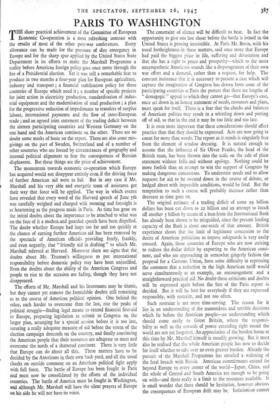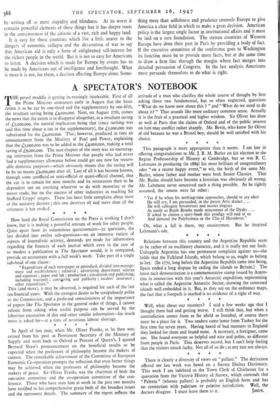PARIS TO WASHINGTON
THE sheer practical achievement of the Committee of European Economic Co-operation is a most refreshing contrast with the results of most of the other post-war conferences. Every allowance can be made for the pressure of dire emergency in Europe and for the sharp spur applied by the United States State Department in its efforts to make the Marshall Programme a reality before American foreign policy goes once more through the fire of a Presidential election. Yet it was still a remarkable feat to produce in two months a four-year plan for European agriculture, industry and transport ; a financial stabilisation policy for those countries of Europe which need it ; a number of specific projects for joint action in electricity production, standardisation of indus- trial equipment and the modernisation of steel production ; a plan for the progressive reduction of impediments to transfers of surplus labour, international payments and the flow of inter-European trade ; and an agreed joint statement of the trading deficit between the sixteen participating countries and Western Germany on the one hand and the American continent on the other. There are no doubt some marks of haste on the report. There are also some mis- givings on the part of Sweden, Switzerland and of a number of other countries who are forced by circumstances of geography and internal political alignment to fear the consequences of Russian displeasure. But these things are the price of achievement.
. The momentum towards economic co-operation which Europe has acquired would not disappear entirely even if the driving force of further American aid were to fail. But in any case if Mr.
Marshall and his very able and energetic team of assistants get their way that force will be applied. The way in which events have revealed that every word of the Harvard speech of June 5th was carefully weighed and charged with meaning and foresight is as heartening as the progress made in Paris. As time has gone on the initial doubts about the importance to be attached to what was on the face of it a modest. and guarded speech have been dispelled. The doubt whether Europe had leapt too far and too quickly at the chance of earning further American aid has been removed by the spectacle of American officials providing freely, frankly, and even urgently, that " friendly aid in drafting " to which Mr. Marshall referred at Harvard. Moreover there are signs that the.. doubts about Mr. Truman's willingness to put internationals responsibility before domestic policy may have been unjustified. Even the doubts about the ability of the American Congress and people to rise to the occasion are fading, though they have not disappeared.
The efforts of Mr. Marshall and his lieutenants may be titanic, but they cannot yet remove the formidable doubts still remaining as to the course of American political opinion. One behind the other, each harder to overcome than the last, rise the peaks of political struggle—finding legal means to extend financial first-aid to Europe, preparing legislation to submit to Congress on the larger plan, arranging for a special session before it is too late, securing a really adequate measure of aid before the storm of the election campaign descends on the country, and finally convincing the American people that their resources are adequate to meet and overcome the needs of a shattered continent. There is very little that Europe can do about all this. These matters have to be decided by the Americans in their own back yard, and all the usual checks on outside comment on an American political fight apply with full force. The battle of Europe has been fought in Paris and must now be consolidated by the efforts of the individual countries. The battle of America must be fought in Washington, and although Mr. Marshall will.have the silent prayers of Europe on his side he will not have its voice. The constraint of silence will be difficult to bear. In fact the opportunity to give one last shout before the battle is joined in the United States is proving irresistible.. At Paris Mr. Bevin, with his usual forthrightness in these matters, said once more that Europe had paid the biggest price in life, suffering and devastation and that she has a right to peace and prosperity—which to the more unsympathetic Americans sounds like a disparagement of their own war effort and a demand, rather than a request, for help. The constant insistence that it is necessary to present a case which will capture the imagination of Congress has drawn from some of the participating countries at Paris the protest that there are lengths of demagogic " appeal to which they cannot go—that Europe's case, once set down in an honest statement of needs, resources and plans, must speak for itself. There is a fear that the checks and balances of American politics may result in a whittling down and putting off of aid, so that in the end it may be too little and too late.
It is even more important that these considerations should affect practice than that they should be expressed. Acts are now going to count for more than words. The report as it stands is singularly free from the element of window dressing. It is natural enough to assume that the influence of Sir Oliver Franks, the head of the British team, has been thrown into the scale on the side of plain statement without frills and without apology. Nothing could be more foolish than an attempt to win the support of Congress by making dangerous concessions. To understate needs and to allow requests for aid to be sweated down in the course of debate, or hedged about with impossible conditions, would be fataL But the temptation to such a course will probably increase rather than decrease as time goes on.
The original estimate of a trading deficit of some 29 billion dollars has been cut down to 22 billion and an attempt to knock off another 5 billion by means of a loan from the International Bank has already been shown to be misguided, since the present lending capacity of the Bank is about one-tenth of that amount. British experience shows that the limit of legitimate concession to the desire of American politicians to impose safeguards is very easily crossed. Again, those countries of Europe who are now striving to redress the dollar deficit by exporting to the American conti- nent, and who are approaching in somewhat gingerly fashion the proposal for a Customs Union, have some difficulty in repressing the comment that a reduction in the high American tariff would serve simultaneously as an example, an encouragement and a straightforward practical aid. No doubtethese criticisms and doubts will be expressed again before the fate of the Paris report is decided. But it will be best for everybody if they are expressed responsibly, with restraint, and not too often.
Such restraint is not mere time-serving. The reason for it lies in an understanding of the tremendous and terrible decisions which lie before the American people—an understanding which should come easily to Great Britain, where the responsi- bility as well as the rewards of power extending right round the world are not yet forgotten. An appreciation of the burden borne at this time by Mr. Marshall himself is steadily growing. But it must also be realised that the whole American people has now to decide for itself whether to take over an even greater burden. Already the pursuit of the Marshall Programme has entailed a widening of the fatal breach with Russia. American commitments extend far beyond Europe to every corner of the world—Japan, China, and the whole of Central and South America are enough to be going on with—and there really is a limit to the resources available. It is small wonder that there should be hesitation, however obvious the consequences of European drift may be. Isolationism cannot be written off as mere stupidity and blindness. At its worst it contains powerful elements of these things but it has deeper roots in the consciousness of the citizens of a vast, rich and happy land.
It is easy for those countries which live a little nearer to the dangers of economic collapse and the devastation of war to say that American aid is only a form of enlightened self-interest for the richest people in the world. But it is not so easy for Americans to listen. A decision which is made for Europe by events has to be made by Americans out of intelligence and forethought. What is more it is not, for them, a decision affecting Europe alone. Some- thing more than selfishness and prudence counsels Europe to give America a clear field in which to make a great decision. American policy is the largest single factor in international affairs and it must be laid on a sure foundation. The sixteen countries of Western Europe have done their part in Paris by providing a body of fact. If the executive committee of the conference goes to Washington its function must be to provide more facts, but at the same time to draw a firm line through the margin where fact merges into detailed persuasion of Congress. In the last analysis Americans must persuade themselves to do what is right.



































 Previous page
Previous page